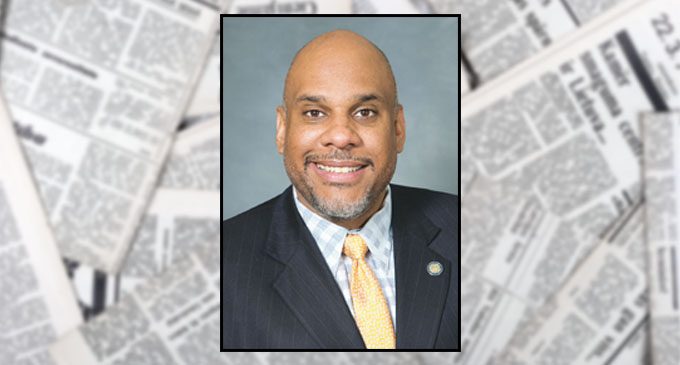N.C. Rep. Hanes explains why he supported nuisance measure

BY CASH MICHAELS
FOR THE CHRONICLE
It’s a bill that many civil rights groups and environmentalists vehemently oppose, charging that it puts poor people, particularly African-Americans, at risk.
But Monday evening, state Rep. Ed Hanes Jr. (D-Forsyth) voted along with the majority to pass HB467 anyway, saying that it came down to a very difficult choice – jobs or nuisance.
“It’s a conundrum for sure,” Rep. Hanes says.
HB 467 – Agriculture and Forestry Nuisance Remedies, is “an act to clarify the remedies available in private nuisance actions against agricultural and forestry operations.”
This may not sound like something of key concern to African-Americans in Winston-Salem or elsewhere, until you consider the number of farms in Forsyth and surrounding counties, and the large number of poor, mostly black families living near or next to them.
According to the U.S. Department of Agriculture in 2012, there were over 660 farms in Forsyth County, down from 680 in 2007. While most specialized in crop items (grain, tobacco, vegetables), a few specialized in livestock (chickens, cattle, hogs, pigs).
In a Jan. 12, 2017 letter from Us environmental Protection agency’s external Civil right Compliance office (ECRCO) in Washington, DC, to William Ross, Jr., Acting Secretary of the NC Dept. of Environmental Quality (NCDEQ), informing Ross that, based on an ongoing federal investigation spurred by a complaint, “preliminary information gathered” per NC DEQ’s operation of the Swine Waste Management System General Permit has given ECRCO “deep concern about the possibility that African-Americans, Latinos, and Native Americans have been subjected to discrimination as a result…” of that permit.
That complaint to ECRCO was filed by the environmental group, Earthjustice, under Title VI of the Civil Rights Act of 1964 alleging discrimination based on race and national origin due to inadequate measures to control, dispose of, and monitor animal waste from industrial swine feeding operations [subjecting] African-Americans (and other people of color) to discriminatory impacts like health issues, noxious odors, nuisances, increased expenses, social and psychological harms, declining property values.”
Federal investigators spoke to many poor families living close to these swine operations, and found many having to change how they lived because of “overpowering stench, a constant large number of flies and truck traffic…” People complained of “gagging, nausea and/or vomiting,” adding that as a result, they’re confined to their homes, and when young people leave their communities, they “…do not return because of the odors.”
In the face of that, HB 467 put legal limitations on the amount of damages those people could recover from those swine and farming operations which produce such conditions.
According to the bill, if the nuisance is permanent, compensatory damages “shall be measured by the reduction in fair market value of the plaintiff’s property caused by the nuisance, not to exceed the fair market value of the property. “
“If the nuisance is temporary, compensatory damages are limited to the diminution of the fair rental value,” the measure adds.
Rep. Hanes, in a written statement to The Chronicle, said, “I’m getting just as many calls from poor black people saying “look, it’s messed up but we can’t risk losing Smithfield down here … then we’ll be in real trouble,” referring to the Smithfield Foods hog plant down east.
“I detest corrupt plaintiffs attorneys as much as the next man,” Hanes continued. “The truth here is that attorneys on both sides are pitting poor people against poor people. A bunch of those poor people are black. On one side you have poor contract farmers who are adhering to the law and involved with an industry that is the life blood of their region.”
“On the other, you have poor people who have no real choice but to live within the “strike zone” of these operations and suffer the consequences of such. What do you do: protect the business so that you protect the jobs of a region, or, protect the people who don’t work those jobs but who live in the region?
“I believe the answer is somewhere in between but it can’t start with a $1billon dollar finding against a business that has been operating under the law for years in an area that has been raising poultry and pigs for years (and suffering the consequences).”
Rep. Hanes also voted for a late amendment that exempted 26 civil lawsuits filed by 541 residents in Eastern North Carolina currently pending in federal court against Murphy-Brown, a subsidiary of Smithfield Foods. Those suits can proceed for the dollar amounts requested in lieu of this bill if it becomes law.
Rep. Hanes also complained in his statement that, “What is punishing for black folks [are] Democratic politicians who refuse to acknowledge simple economics and then twist it into a racial issue to corner black politicians specifically (and when convenient)…”
The Chronicle did a cursory check on how many other black state House members voted for the bill, and didn’t see any.
Guilford County Rep. Cecil Brockman, also a Democrat, was one who voted against HB467.
“I voted against H.B. 467 because I did not want to leave poor North Carolinians vulnerable,” he said in a statement. “I understand the important role agriculture plays in our state’s economy. However, I think there are reasonable ways to address the negative effects of this industry and this bill would have interfered with those.”
Brockman’s Forsyth County Democratic colleague, Rep. Evelyn Terry, agreed.
“I am a lawmaker whose bias for fair and equitable principles bends toward those whose needs I understand well enough to vote for,” she said. “In this bill, even with the amendment that brings clarity and relief for some farmers, we meddled in the judicial system’s business.”
Rep. Terry continued, “ Sad, since agriculture is, and has been the most important economic driver on this state, and among the top in the nation.”
HB 467 now goes to the state Senate as Senate Bill 460. The Chronicle requested comment from Sen. Paul Lowe on how he was going to vote, but did not hear back from him by press time Tuesday.
















